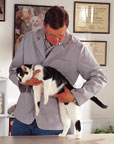Are special diets for kidney disease really accepted by cats?

Introduction Renal foods are used to manage chronic kidney disease (CKD) in dogs and cats, but their effectiveness may be limited by the ability to transition animals to them.
Material and Methods In a prospective study, pet cats with previously undiagnosed kidney disease (20 International Renal Interest Society (IRIS) 1, 61 IRIS 2, 14 IRIS 3/4, 33 at risk for CKD) were transitioned to a renal food. Markers of renal function were measured and owners answered questionnaires about their pet over one year.
Results All but eight cats (120/128; 94 per cent) successfully transitioned to the renal food. Most of the time, cats moderately or extremely liked the food (89 per cent), ate at least half (73 per cent) and were moderately or extremely enthusiastic while eating (68 per cent). Cats rarely disliked the food (2 per cent) or refused to eat it (1 per cent). Markers of renal function were unchanged in IRIS 1 and 2 cats and changed little in IRIS 3/4 cats. In all groups, owner-assessed quality of life improved initially and then remained stable. Mean bodyweight did not change in cats with CKD.
Conclusions Most cats with CKD successfully transitioned to the renal food. The results also support previous studies that the renal food can help stabilise cats with CKD.
Click here to be directed to the study in the Journal of the British Veterinary Association.

